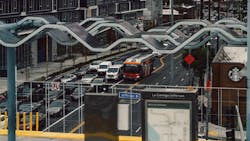L.A. Metro Board approves new Transit Ambassador Program to help improve customer experience
The Los Angeles County Metropolitan Transportation Authority (L.A. Metro) Board of Directors approved two contracts to staff the new pilot transit ambassador program, which aims to make the system a more welcoming and safer environment.
When the transit ambassador program launches in late summer or fall, ambassadors will be on L.A. Metro buses and trains and in stations to greet riders, help them navigate the system, pay fares, download key L.A. Metro apps and work with L.A. Metro to quickly address issues.
Ambassadors will be on the system from 5:00 a.m. to 9:00 p.m. from Monday through Friday and from 8:00 a.m. to 8:00 p.m. on Saturday and Sunday. The ambassadors will have new uniforms so they’re easily seen by riders and will have phones and/or radios to easily reach other L.A. Metro staff.
The program was modeled on existing ambassador programs run by Bay Area Rapid Transit and Southeastern Pennsylvania Transportation Authority, transit agencies that serve the Bay Area and the Greater Philadelphia metro area, respectively. L.A. Metro’s Public Safety Advisory Committee (PSAC) also helped shape the program. Riders in recent surveys also showed overwhelming support for such a program — in particular saying they wanted to see more L.A. Metro staff on the system.
The ambassador program will be housed outside of the System Security and Law Enforcement Department. L.A. Metro says public safety is important — but the emphasis here is to greet riders and have the time to create positive and compassionate interactions with them. The ambassadors will also work with crisis intervention teams to help connect riders who are unhoused or experiencing mental health crisis to social services.
The ambassador program will be a three- to five-year pilot and the agency will use customer feedback and other data to refine it as it goes. The ambassadors will be supplied by two firms: Strive Well-Being Inc., which is a Small Business Enterprise firm, and RMI International Inc (RMI), a Minority Business Enterprise firm.
Strive Well-Being proposes to recruit ambassadors from three community-based organizations — Union Station Homeless Services, Communities Actively Living Independently & Free and Homeboy Industries. RMI proposes to supplement its recruitment of ambassadors by working with WorkSource Regional Business Services and the Southeast Los Angeles County Workforce Development Board.
These will also be good jobs for those who serve as ambassadors, paying at least the living wage, which is currently almost $22 in California. L.A. Metro says it wants ambassadors to enjoy the job, stick around and gain valuable experience. Prior to being deployed, all ambassadors must complete training by L.A. Metro that will include cultural and situational awareness, unconscious bias training, disability awareness, customer service, trauma-informed response and other personal and public safety courses.
